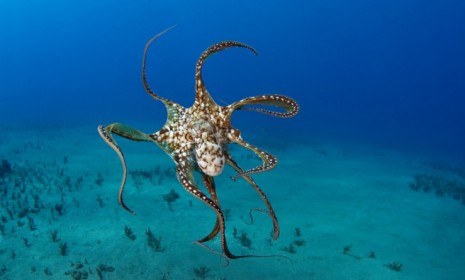The octopus' 'human-like' intelligence
The eight-armed mollusk can use tools, recognize humans, and even play games. Time to bow down before our new cephalopod overlords?

A free daily email with the biggest news stories of the day – and the best features from TheWeek.com
You are now subscribed
Your newsletter sign-up was successful
Octopuses are smarter than we thought. A mounting pile of evidence suggests that the eight-armed sea creatures exhibit a number of "human-like" tendencies that put them on the same intellectual plane as the wilier house pets. Here's why scientists have new respect for invertebrate cephalopods:
What "human-like" tendencies have been exhibited?
One octopus in captivity was observed "cleaning the front of its den" after securing food, then carefully arranging rocks to cover the entrance before going to sleep. Such an endeavor requires "foresight, planning," and "even tool use," says Sy Montgomery at Orion Magazine. In another study, octopuses "learned to open childproof caps on Extra Strength Tylenol Pill bottles — a feat that eludes many humans."
The Week
Escape your echo chamber. Get the facts behind the news, plus analysis from multiple perspectives.

Sign up for The Week's Free Newsletters
From our morning news briefing to a weekly Good News Newsletter, get the best of The Week delivered directly to your inbox.
From our morning news briefing to a weekly Good News Newsletter, get the best of The Week delivered directly to your inbox.
Hmm. What else?
One female octopus was observed "blowing carefully modulated jets of water from her funnel to send [a pill bottle] to the other end of her aquarium, where the water flow sent it back to her. She repeated the action 20 times," Montgomery reports. One excited researcher quickly got on the phone to call her colleague: "She's bouncing the ball!"
How about their memories?
Octopuses can remember humans, says Josh Rothman at the Boston Globe, and "have particular human friends and nemeses." The animals recognize their own names when called out, crawling affectionately towards caretakers they like. If an octopus isn't enamored of you, he'll squirt water at you when you call.
A free daily email with the biggest news stories of the day – and the best features from TheWeek.com
So they must have big brains, right?
Nope. Most octopuses kept in aquariums have only walnut-sized brains, on par with the gray matter of talking parrots. What's "weird," says Montgomery, is the distribution of the octopus' neuron count. While the creatures only boast about 130 million neurons (humans have 100 billion), three-fifths of an octopus' brain cells aren't even in its head — they're in its arms, as if each tentacle has "a mind of its own," allowing it to feel out environments in a way researchers are still trying to understand.
How did the animal get so smart?
Scientists think the loss of the ancestral shell eventually sharpened the animals' wits. Though the modern octopus' lack of a shell leaves him more mobile for hunting, it also leaves him vulnerable to bigger predators. "Only the smartest octopuses would survive — the ones who could hide the most cunningly, traveling alone to avoid exposure," says Annalee Newitz at io9. It's why the animals "use tools to hide all the time."
Source: Boston, io9, Orion Magazine
-
 What to watch out for at the Winter Olympics
What to watch out for at the Winter OlympicsThe Explainer Family dynasties, Ice agents and unlikely heroes are expected at the tournament
-
 Properties of the week: houses near spectacular coastal walks
Properties of the week: houses near spectacular coastal walksThe Week Recommends Featuring homes in Cornwall, Devon and Northumberland
-
 Will Beatrice and Eugenie be dragged into the Epstein scandal?
Will Beatrice and Eugenie be dragged into the Epstein scandal?Talking Point The latest slew of embarrassing emails from Fergie to the notorious sex offender have put her daughters in a deeply uncomfortable position